- Home
- Chris Wraight
JAGHATAI KHAN WARHAWK OF CHOGORIS Page 2
JAGHATAI KHAN WARHAWK OF CHOGORIS Read online
Page 2
‘The lexicographers will have the syntax decoded in a month. Then at least we’ll be able to use transcoder beads. Until then, it’s fumbling and stumbling.’
‘Fumbling and stumbling,’ Yesugei repeated, liking the sound of the words. ‘Yes, all of us.’
‘The rest, maybe. You, not so much.’ She ran her finger absent-mindedly up the length of the staff, right under the iron symbol of Malcador’s office. ‘You have an interesting mind, Targutai Yesugei. I sensed it when your delegation arrived, and now I’m standing close to you, I feel it more strongly. You know what I mean, I think.’
He smiled. Like all his kin, when he smiled his whole face creased. ‘Weather-magic,’ he said. ‘They told us it causes trouble.’
‘Weather-magic? How quaint. I’ve seen reports of what you can do with it. I think you’d better come up with a better name.’
‘Suits us.’
‘But it’s dangerous, this business.’ She looked at him more seriously. ‘That’s why we brought you here. Well, it’s one of many reasons, but an important one. You don’t hide it. You don’t seem to feel the need. I could admire that, but you’ll need to learn to.’
Yesugei looked at her quizzically.
‘Your master is the fifteenth primarch to be located,’ Niasta said. ‘His brothers were all brought here, just as he has been, and inducted into the ways of the Crusade. I saw them all come, one by one, ushered into the Palace and cloistered with the Emperor. Then I saw them go again, out into the void, where they now forge the Imperium at the head of the mightiest armies ever created. Each one of them would be a monarch on his own if allowed to be, an emperor greater than any that’s gone before, and yet they fight not for themselves, but for a greater vision. His vision.’
Yesugei nodded. ‘Is understood.’
‘Then you understand the danger. It is Unity. It is conformity. It has inherent vice. They must learn, all of them, and they must trust. So many of them find that difficult. How could they not? Even I struggle with it, and I’m not tempted by your outrageous martial prowess.’
‘This, also, is understood.’
Niasta laughed. ‘So you know what’s coming. The Khan has spoken with his Father often since we brought you to Terra, and we know it’s not gone well. This is not uncommon, but we need it to go better.’
Yesugei sighed, and looked out of the window again. ‘Tell him, then. I am not master – he is.’
‘This is our message – there are no gods, there is no magic, there is only reason. This is our only weapon, the one sanctioned by Him, beloved of all, who set this thing in motion.’
‘Is nonsense.’
Niasta smiled tolerantly. ‘Which is, I gather, exactly what the Khan told the Emperor. And that’s what’s giving my master considerable trouble, and when our respective masters are at loggerheads, it falls to us to smooth things over.’
‘Logger heads?’
‘You know precisely what I mean.’
Yesugei smiled sadly, knowingly. ‘You wish us to lie.’
‘We wish you to be sensible.’
‘He will never lie.’ Yesugei lost his smile. ‘He has fault. All men have fault. But not this. He make an oath, the oath is kept. You understand?’
‘This is not about truth,’ Niasta said, just a trace of exasperation creeping into her polished voice. ‘It doesn’t need to be.’
Yesugei pursed his cracked lips. The ritual tattoos flexed as his skin moved, forming new and esoteric shapes across sun-toughened flesh. ‘We are warriors. We have weapon, we use it. Does not master us, we master it. That is balance.’
‘He needs to meet the Sigillite,’ Niasta said. ‘He needs to meet Malcador.’
Yesugei shrugged. ‘May not be possible.’
‘Make it possible.’
He turned to face her, looking at her carefully for the first time. ‘Your eyes,’ he said. ‘What happened?’
Niasta looked away. ‘Soul-binding,’ she said. ‘Most lose them.’
‘Soul-binding,’ Yesugei mused, softly. ‘So there are souls, then.’
‘Do not be obtuse.’
‘Be honest, with me. You have sight, both kinds. What is inner sense used for?’
‘I am not used. I serve.’
‘Now, yes. The future – who knows?’ He drew closer, and his golden eyes reflected the light from the window. ‘What you sense in me, Niasta, I sense in you. But be careful. We do not lie, even to ourselves. Perhaps you do.’
‘Get him to meet Malcador. That’s all I need.’
Yesugei hesitated, as if he wanted to say more. Then he thought better of it and turned away, back to the window.
‘I do what I can,’ he said.
TWO
Giyahun looked out of the viewport as the shuttle pulled clear of the lower orbital zones. Until a year ago, his feet had never left the ground unless mounted, which wasn’t much different, as Chogorian equines were not large. His world had been that of a single sun, hard wind on his limbs and the soft rush of a grassland that had no limits. The sky had been for him, as it was for all his kin, the arch of heaven, the altar of devotion and the arbiter of battle-fate, a barrier none could pass in life.
Once, a long time ago by any mortal standards, he had ridden at the head of a raiding party along the ridge of high ground the Nan people called the Anshu Shoulder. As the sun had been setting, he had pulled up along the edge, where the terrain fell in sheer terraces down to the gaping emptiness below. That had been his first sight of the Altak, the plains that ran across half the planet, unbroken by mountain or wall, home only to the restless confederations of mobile nations with their herds, their hide tents, their hunt-trails and their endless vendettas.
There he had paused, sat back on the spine of his aduu mount, the sweat rising from both their hot flanks. There he had watched the gold-red ember of the sun sink towards the emptiness, turning the grass into a lake of fire. And there he had thought to himself: This is all there is. This is the bow-curve of the world. If a man can conquer this, he has conquered creation.
He smiled at the memory. That was so long ago. He had gone from a warrior of the Nan, to a warrior of the Khitan, to a warrior of the ordu of Jaghatai. The Khagan had never been a vengeful overlord – he had always folded defeated armies into his own, gathering up the warring factions of the plains one by one until their numbers swelled beyond counting. Ancient bad blood was drained away quickly – all the Khagan cared about was whether you could wield a tulwar, could handle your mount, would follow an order and would stand your ground when the enemy turned to face you. In time, that was all the previously feuding clans cared about too.
That was why Jaghatai was loved with that fierce, uncompromising love that Chogorians reserved only for sworn blood brothers. He had exalted them. He had ridden beside his sons for many years, enduring what they endured, suffering what they suffered, passing from wild rumour into legend. He was the lord of the plains, the berkut, the khan of all khans.
And yet, even when every wall had been demolished, every palace ransacked and all empires lain waste, even then did the boundaries of experience retreat a little further.
Giyahun had been wrong. There was more, far more, to conquer than the Altak. There were other worlds, a million of them, each as unlike one another as the piebald flesh of the herds – some were bathed in flame, others gripped by the iron vice of primordial cold; some were literally beyond understanding.
It could turn the mind, if you thought about it too hard. His kind had all been raised in a world of limited truths, resource-scarce and spare. Now there was an infinity of experience to absorb. It was, as the old zadyin arga Hogal had said before the attempt at ascension had killed him, a hard drink to gulp down.
The shuttle shook as the drives shifted into a higher register. The grey-gold sweep of Terra’s face was long gone, melting back into a shrinking orb, stealing away all that madness and clamour. The Palace already seemed like some bizarre waking dream, a phantasm sent by sorcerers.
Giyahun turned to look at his master. The Khan sat back in a clamshell seat, outsized within its legionary-dimensioned frame, his long limbs spilling out. His lean face was pensive. His fingers played restlessly on the hilt of his great blade, snagging at the leather-wound grip as if he might pick it apart.
‘You cannot tell me what He said to you?’ Giyahun ventured.
The Khan looked up at him, roused from his thoughts, then smiled grimly.
‘I’m still trying to decide,’ he said. ‘It’s hard, with Him, to know. Hard even to look at Him.’
The Khan ran his hand over his face, rubbing at the scar that ran down his left cheek.
‘He’s done this fourteen times before,’ he said. ‘When my brother Horus was returned, there were festivals here for a month, they told me. Now they barely notice another one arriving. And yet, for us…’ He shook his head. ‘A year ago, all you could do was hang off a mount and build a fire from its dung. Now look at you.’
Giyahun chuckled.
‘I should admire Him more, I know,’ the Khan said, pensively. ‘I should be able to see what it is that makes them love Him.’
‘Safety,’ offered Giyahun, shrugging.
‘Aya, we should be aiming for more than that.’ The Khan stretched his arms out – huge arms, encased in the new battleplate wrought for him on Luna by the finest armourers in the galaxy. ‘I wish to meet my brothers now, Giyahun. My curiosity burns. I wish to see if they’re all as bloodless as these parchment eaters here, or if they have some spine lodged in their backs.’
Giyahun didn’t reply. He had no concept of what another primarch would be like, and nor did he care. One was enough.
‘We need the means to roam again,’ the Khan said, sitting forwards and looking out of the main viewport. ‘That, at least, is something these people can do for us.’
They were drawing closer. Giyahun turned, following the Khan’s gaze, and saw the first of Luna’s great void-docks swelling up out of the darkness. Cradled within it, festooned with the flicker of electro-welders, was a starship. It was spare and rangy like its presumptive master, a spear-prowed monster. The enginarium was open, flayed and displaying its internal organs – a vast conglomeration of plasma chambers and powerlines. Even as they watched, Mechanicum-red haulers deposited another heavy component, turning it silently and slowly in the frozen void.
The Khan stared at it. A kind of possessiveness lit his features. He looked at the starship like he were looking at a prize stallion, or at a guarded citadel ripe for the taking.
‘Now this is something I could make use of,’ he murmured softly. ‘I wonder what they call it?’
‘Star Hunters,’ said Hasik, enunciating the words uneasily.
He had known the name ever since the Khagan had come back from his first meeting with the Emperor, back when they were all still in shock and it felt as if the world were cracking open under their feet. In the months that had followed, the name had loomed ever larger, made into actuality by the warriors in grey who had made their way to Chogoris to pay homage to their new master. He remembered the first time he had laid eyes on one of them – impossibly tall, impossibly bulky and clad in armour that made his own leather and silk battle-garb look hopelessly fragile.
In truth, Hasik was a Star Hunter now too. He had survived those hellish rites, accelerated into a single year of intensive surgery, and now wore the heavy overlapping plate armour of the Imperium, just as they did. The lacquered faces of his plate were the same pale grey, marked with the angular Legion ‘V’ and festooned with tactical designators he barely understood. Every piece of livery had come from another world, solidified over eighty years of constant campaigning.
It was still a strange notion. This army had been fighting without its general for a human lifetime, accumulating doctrines and battle honours on its own, rampaging across the galaxy like some headless beast with its own purposes, idiosyncrasies and hungers.
In theory, Hasik was now one of its two senior commanders. In practice, he barely knew how to address those in the ranks, overwhelmingly drawn as they were from regions of Terra he could scarcely pronounce, let alone understand.
Now he surveyed them. Their helms glinted under sunlit skies, ranked across a wide parade ground within the Palace confines. There must have been several hundred assembled there, the kind of formation he would have commanded on Chogoris as a minghan, but which here went by other names. Great vehicles sat idling on the edges of the ground: tracked personnel carriers, ground attack bikes, grav-flyers with underslung projectile weapons.
The unit was well equipped. He understood more about the machinery than he did about those who controlled it. Since his ascension, his mind worked faster than it had once done, and facility with arms came naturally. He had learned to pilot the grav-flyers as expertly as he had once ridden a living mount. He had learned to aim the bolters and duel with the energy-wreathed blades. He understood that the Star Hunters were a mechanised Legion, one to whom machines had been supplied in abundance, charged with providing first-strike expertise to a Crusade warfront that was endlessly expanding. Some of this he appreciated. Other things were still bewildering.
Not that he could show that now. Hundreds of eyes were on him, hidden behind helm-lenses but fixed on him nonetheless, scrutinising him just as he studied them. They would need to see only strength, or he would never gain their respect. Some things were a mystery to Hasik, but after a lifetime leading men against the lost empires of Chogoris, that at least was not.
‘Tell me again,’ he said to his adjutant.
The company commander, who went helmless just as Hasik did, nodded. ‘The Fourth Company of the Third Chapter, recently returned from active service on the Hovian Perimeter. The first to be recalled to Terra for assimilation into the new command. Other units are in the void, and much of the rest of the Legion is still beyond contact range.’
‘And your name,’ said Hasik. It was hard to converse in Gothic all the time, to recall the endless tide of details and absorb what they meant. His mind had become so acute in so many ways, but something about Terran idioms always resisted assimilation. They were alien ways still, fitting uneasily into souls attuned to another world.
‘Namaz,’ replied the company commander.
‘Namaz,’ repeated Hasik slowly.
He walked up to the front rank of the assembled company. They waited in perfect, rigid silence. Their armour looked heavy under that clear sunlight. Hasik paused before a warrior bearing a serpent motif on his shoulder guard. He might have been told what that signified, or he might not – it was hard to remember.
For a moment they stood facing one another, Terran and Chogorian, a metre apart. Hasik was a few centimetres shorter, but there was otherwise little to differentiate between them.
When Hasik moved, the speed was blistering – his clenched fist flew whistling towards the warrior’s faceplate. The Terran reacted equally quickly, catching it in his palm. They pushed against one another for a moment, piling complementary pressure, bringing to bear that astonishing combination of gene-wrought muscle and techno-mechanical augmentation.
Then Hasik released, laughing. ‘Good,’ he said. The Terran remained silent. ‘Do not take a strike from anyone. Not even me.’
He lifted his head, looking out over the ranks.
‘He will change you, though,’ he called out, and his accented voice sounded strange on the skirling Terran wind. ‘He changed us, so do not stand against it. When he lifts his blade, keep yours down. He is the Khagan, the conqueror of conquerors, and you will be his blood-kin. All are taken, all may serve.’
As he spoke, the words began to come. Perhaps declaiming Gothic was easier than attempting to use it subtly. Perhaps it was a language made for command, rather than more fluid forms of expression.
And they were listening. Sceptically, perhaps, but they absorbed the words readily enough.
‘Until now you were no man’s servant save the Emperor in this place,’
Hasik said. ‘Soon you will be the Khan’s army, the ordu na Jaghatai. You will learn a new way of war. We will teach it to you. Embrace it, you become greater. Scorn it, you will be trodden under his feet.’
They listened, but there was no way of knowing if they had truly taken it in. They were like automata, perfectly drilled and soulless. They might have found the words uplifting. More likely they found it insulting – these things would take time.
Hasik turned to Namaz. He felt a certain heaviness on his soul. This was just the start.
‘Begin your drills now,’ he ordered. ‘Let us see what we have to work with.’
The starship was a conurbation, bounded and bordered by the metallic sweeps of docking tethers and surrounded by clouds of welder-drones. Most of the decks were exposed to the void, yet to be cocooned in the heavy ablative plates that would keep them secure from all but the very mightiest void weapons. Constructor-servitors floated amid the lattices of steel, bumping up against half-completed bulkheads before applying their payloads. Spider-legged priests of Mars scuttled across the yawning cavities, shunting binaric commands to one another as they assessed and gauged and commanded.
It had taken them two hours to pilot the shuttle from stern to prow, threading along the precipices and chambers amid a shimmering corona of energy flares. Their Terran hosts had gone at a leisurely pace, showing off everything they could. The official from the Palace, now revealed as Ert Ech Slavomar, Major-General of the First Division, Corps Logisticae, was clearly proud of what had been accomplished.
‘Perhaps the finest one yet,’ he said, leaning closer to the real-viewer. ‘We’ve had time to perfect the pattern. There’s a reason, my lord, why they’re called Gloriana.’
Giyahun scratched at his cheek. He was getting hungry.
The shuttle pivoted on an invisible axis and began to climb, gliding past row after row of semi-completed decks. At times a long avenue would open up, giving a glimpse into the vessel’s structural heart. The complexity was formidable.

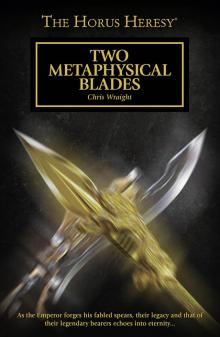 Two Metaphysical Blades
Two Metaphysical Blades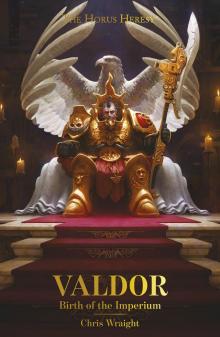 Valdor: Birth of the Imperium
Valdor: Birth of the Imperium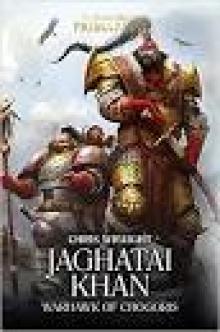 JAGHATAI KHAN WARHAWK OF CHOGORIS
JAGHATAI KHAN WARHAWK OF CHOGORIS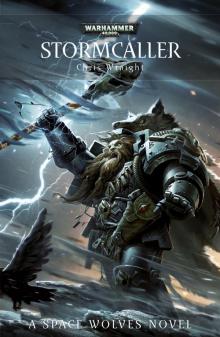 Stormcaller
Stormcaller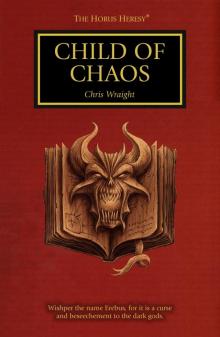 Child of Chaos
Child of Chaos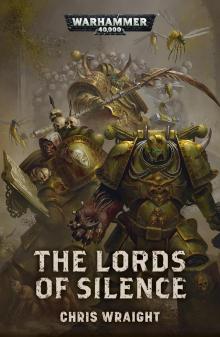 The Lords of Silence
The Lords of Silence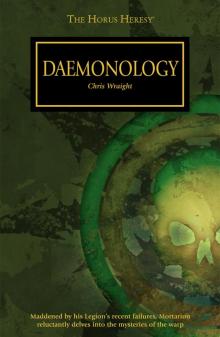 Daemonology
Daemonology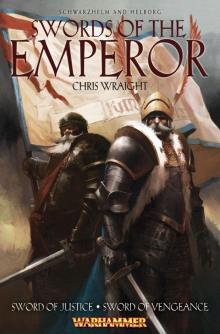 Swords of the Emperor
Swords of the Emperor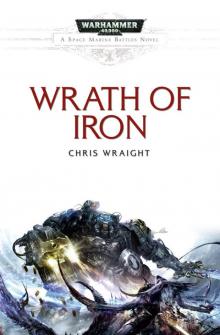 Wrath of Iron
Wrath of Iron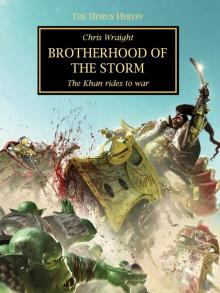 Brothers of the Storm
Brothers of the Storm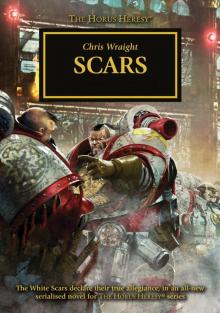 Horus Heresy: Scars
Horus Heresy: Scars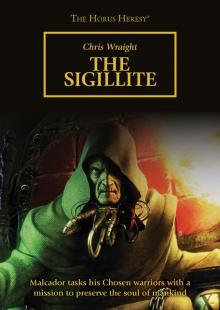 The Sigillite
The Sigillite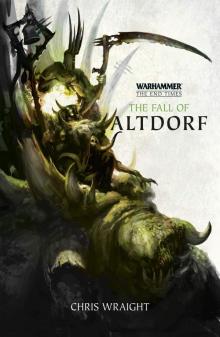 The End Times | The Fall of Altdorf
The End Times | The Fall of Altdorf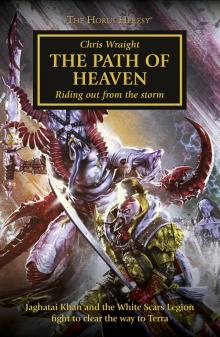 The Path of Heaven
The Path of Heaven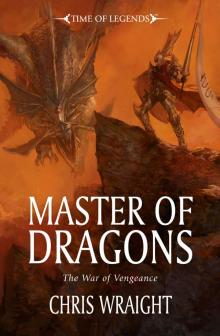 Master of Dragons
Master of Dragons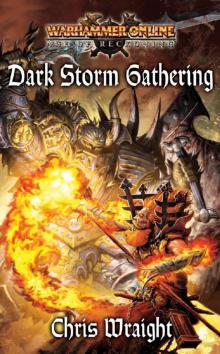 WH-Warhammer Online-Age of Reckoning 02(R)-Dark Storm Gathering
WH-Warhammer Online-Age of Reckoning 02(R)-Dark Storm Gathering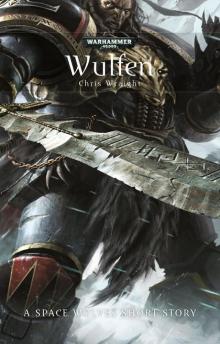 Wulfen
Wulfen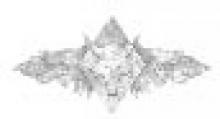 Battle Of The Fang
Battle Of The Fang Onyx
Onyx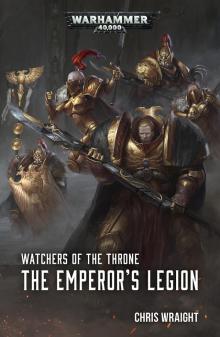 Watchers of the Throne: The Emperor’s Legion
Watchers of the Throne: The Emperor’s Legion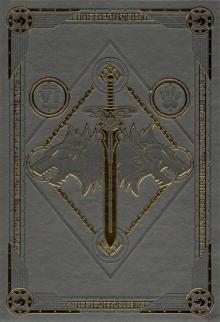 Leman Russ: The Great Wolf
Leman Russ: The Great Wolf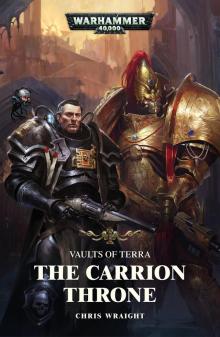 Vaults of Terra: The Carrion Throne
Vaults of Terra: The Carrion Throne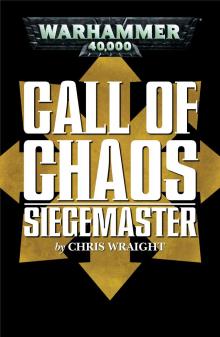 Siegemaster
Siegemaster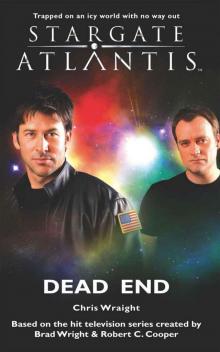 STARGATE ATLANTIS: Dead End
STARGATE ATLANTIS: Dead End Scars
Scars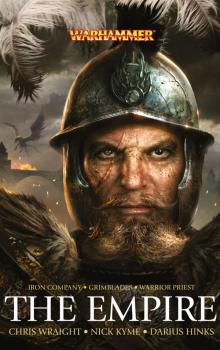 The Empire Omnibus
The Empire Omnibus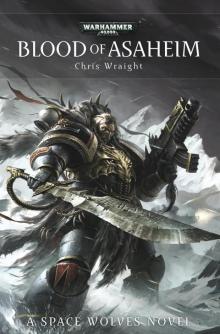 Blood of Asaheim
Blood of Asaheim